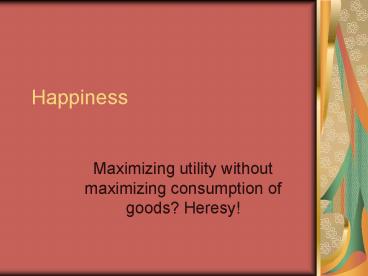Happiness PowerPoint PPT Presentation
1 / 26
Title: Happiness
1
Happiness
- Maximizing utility without maximizing consumption
of goods? Heresy!
2
Seligman 2002
- H S C V
- Happiness (enduring happiness)
- Set range
- Circumstances of your life
- Voluntary control factors
3
General Happiness Scale
- Likert Scale 1 7
- In general, I consider myself Not a very happy
person A very happy person. - Compared to most of my peers, I consider myself
Less happy, more happy - Some people are generally very happy. They enjoy
life regardless of what is going on, getting the
most out of everything. To what extent does this
characterization describe you? Not at all A
great deal
4
General Happiness Scale
- Some people are generally not very happy.
Although they are not depressed, they never seem
as happy as they might be. To what extent does
this characterization describe you? - A great
deal not at all - Divide your score by 4.
5
What your score is based on
- ½ of your score is accounted for by the score of
your biological parents would have gotten had
they taken the test. - Story of the lottery winner does money make you
happier? - The Hedonic treadmill
- As you accumulate more material possessions and
accomplishments your expectations rise.
6
Are the fortunate happier than the unfortunate?
- Less fortunate are by and large as happy as the
fortunate. - In less than 3 months major events (fired or
promoted) lose their impact on happiness. - Wealth has a low correlation with happiness.
- As real income (purchasing power) has increased
in the U.S. happiness has stayed flat.
7
Are the fortunate happier?
- Recent changes in pay predict job satisfaction,
but average levels of pay do not. - Physical attractiveness does not have an affect
on happiness. - Objective physical health is barely correlated
with happiness.
8
How do we try to get happier in the U.S.?
- Make more money
- Have more things
- Be more beautiful
9
What makes us unhappy?
- Loss of a child or spouse in a car crash.
- Caregivers of Alzheimers patients.
10
Circumstances
- What percentage of Americans become clinically
depressed in their lifetimes? - (8 18 not 49)
- What percentage of Americans report life
satisfaction above neutral? - 83 not 56
11
Circumstances
- 2. What percentage of Americans report life
satisfaction above neutral? - 83 not 56
12
Circumstances
- What percentage of mental patients reports a
positive emotional balance (more positive
feelings than negative feelings) ? - 57 not 33
13
Circumstances
- 4. Which of the following groups of Americans
report a negative emotional balance (more
negative feelings than positive)? - Poor African-Americans
- Unemployed men
- Elderly people
- Severely, multiply handicapped people.
14
Circumstances
- All report that they are mostly happy but 83
of Americans guess the opposite for poor African
Americans, 100 guessed the opposite for
unemployed men.
15
Money
- Ive been rich, and Ive been poor. Rich is
better. - Sophie Tucker
- Money doesnt buy happiness
- Proverbial saying
- Cant buy me love
- The Beatles
16
Purchasing power of nations
- U.S. Life satisfaction 7.73 with 100 purchasing
power. - Ireland!! 7.88 with 52 purchasing power.
- Money matters but not much over 8,000 per
person.
17
Marriage is robustly related to happiness
- 40 of married people very happy
- 24 of unmarried people very happy
- Does marriage cause happiness OR are happy people
more likely to get married?
18
Social Life
- Very happy people spend the least amount of time
alone - Most happy people are involved in a romantic
relationship. - Again which comes first happy people have
great social lives or people with great social
lives are happy?
19
Negative Emotion
- Having more than your share of misery does not
mean you cannot have joy as well. - Only a moderate correlation between positive and
negative emotion.
20
Age
- Youth is not what it is cracked up to be. Youth
are not significantly more happy. - However, intensity of emotion (feeling on top of
the world, and depths of despair) declines with
age.
21
Health
- Objective health is barely related.
- Moderate ill health does not bring unhappiness
but severe illness does.
22
Education, Climate, Race and Gender
- None of them relate to happiness.
23
Religion
- Religious people
- Use less drugs, commit less crimes, are less
likely to divorce or kill themselves. - They are physically healthier and live longer.
- Less thrown by divorce, unemployment, illness,
death. - Somewhat happier than nonreligious people.
24
Religion
- Congregates people
- Sympathetic community of friends
- Instill hope in the future
- Create meaning in life
- The more fundamental the more hope.
25
The moral of the story
- Live in a wealthy democracy not an impoverished
dictatorship - Get married (causal?)
- Avoid negative events and negative emotion (only
moderate effect) - Acquire a rich social network (causal?)
- Get a religion (moderate)
26
Dont bother
- Make more money (no effect once you can afford
to read this book more materialistic people are
less happy). - Stay healthy (subjective health not objective
health matter) - Get as much education as possible (not effect)
- Change your race or move to a sunnier climate (no
effect).

